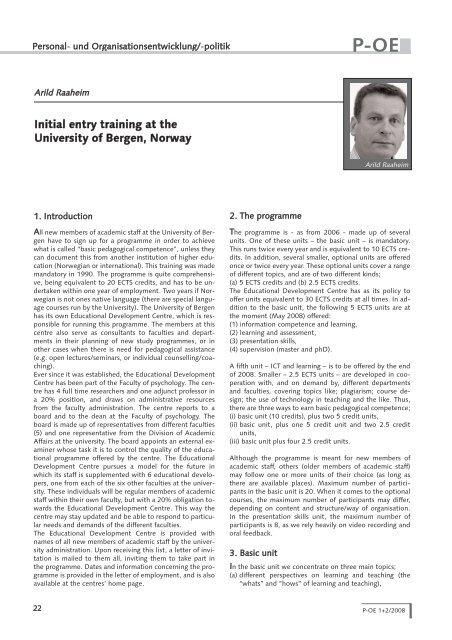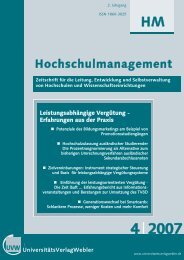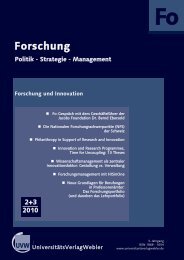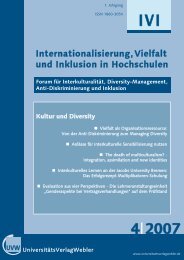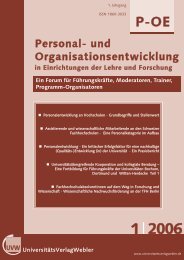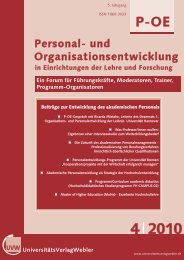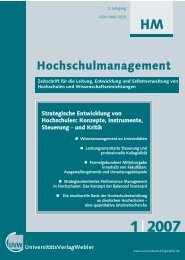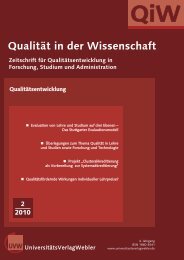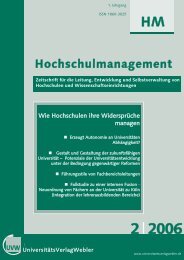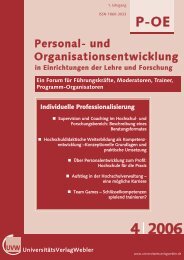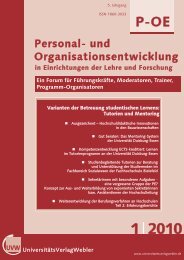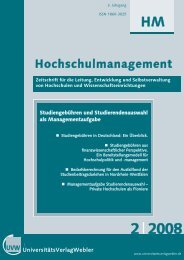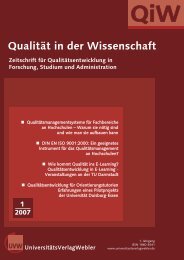P-OE - UniversitätsVerlagWebler
P-OE - UniversitätsVerlagWebler
P-OE - UniversitätsVerlagWebler
Sie wollen auch ein ePaper? Erhöhen Sie die Reichweite Ihrer Titel.
YUMPU macht aus Druck-PDFs automatisch weboptimierte ePaper, die Google liebt.
Personal- und Organisationsentwicklung/-politik<br />
P-<strong>OE</strong><br />
Arild Raaheim<br />
Initial entry training at the<br />
University of Bergen, Norway<br />
Arild Raaheim<br />
1. Introduction<br />
All new members of academic staff at the University of Bergen<br />
have to sign up for a programme in order to achieve<br />
what is called “basic pedagogical competence”, unless they<br />
can document this from another institution of higher education<br />
(Norwegian or international). This training was made<br />
mandatory in 1990. The programme is quite comprehensive,<br />
being equivalent to 20 ECTS credits, and has to be undertaken<br />
within one year of employment. Two years if Norwegian<br />
is not ones native language (there are special language<br />
courses run by the University). The University of Bergen<br />
has its own Educational Development Centre, which is responsible<br />
for running this programme. The members at this<br />
centre also serve as consultants to faculties and departments<br />
in their planning of new study programmes, or in<br />
other cases when there is need for pedagogical assistance<br />
(e.g. open lectures/seminars, or individual counselling/coaching).<br />
Ever since it was established, the Educational Development<br />
Centre has been part of the Faculty of psychology. The centre<br />
has 4 full time researchers and one adjunct professor in<br />
a 20% position, and draws on administrative resources<br />
from the faculty administration. The centre reports to a<br />
board and to the dean at the Faculty of psychology. The<br />
board is made up of representatives from different faculties<br />
(5) and one representative from the Division of Academic<br />
Affairs at the university. The board appoints an external examiner<br />
whose task it is to control the quality of the educational<br />
programme offered by the centre. The Educational<br />
Development Centre pursues a model for the future in<br />
which its staff is supplemented with 6 educational developers,<br />
one from each of the six other faculties at the university.<br />
These individuals will be regular members of academic<br />
staff within their own faculty, but with a 20% obligation towards<br />
the Educational Development Centre. This way the<br />
centre may stay updated and be able to respond to particular<br />
needs and demands of the different faculties.<br />
The Educational Development Centre is provided with<br />
names of all new members of academic staff by the university<br />
administration. Upon receiving this list, a letter of invitation<br />
is mailed to them all, inviting them to take part in<br />
the programme. Dates and information concerning the programme<br />
is provided in the letter of employment, and is also<br />
available at the centres’ home page.<br />
2. The programme<br />
The programme is - as from 2006 - made up of several<br />
units. One of these units – the basic unit – is mandatory.<br />
This runs twice every year and is equivalent to 10 ECTS credits.<br />
In addition, several smaller, optional units are offered<br />
once or twice every year. These optional units cover a range<br />
of different topics, and are of two different kinds;<br />
(a) 5 ECTS credits and (b) 2.5 ECTS credits.<br />
The Educational Development Centre has as its policy to<br />
offer units equivalent to 30 ECTS credits at all times. In addition<br />
to the basic unit, the following 5 ECTS units are at<br />
the moment (May 2008) offered:<br />
(1) information competence and learning,<br />
(2) learning and assessment,<br />
(3) presentation skills,<br />
(4) supervision (master and phD).<br />
A fifth unit – ICT and learning – is to be offered by the end<br />
of 2008. Smaller – 2.5 ECTS units – are developed in cooperation<br />
with, and on demand by, different departments<br />
and faculties, covering topics like; plagiarism; course design;<br />
the use of technology in teaching and the like. Thus,<br />
there are three ways to earn basic pedagogical competence;<br />
(i) basic unit (10 credits), plus two 5 credit units,<br />
(ii) basic unit, plus one 5 credit unit and two 2.5 credit<br />
units,<br />
(iii) basic unit plus four 2.5 credit units.<br />
Although the programme is meant for new members of<br />
academic staff, others (older members of academic staff)<br />
may follow one or more units of their choice (as long as<br />
there are available places). Maximum number of participants<br />
in the basic unit is 20. When it comes to the optional<br />
courses, the maximum number of participants may differ,<br />
depending on content and structure/way of organisation.<br />
In the presentation skills unit, the maximum number of<br />
participants is 8, as we rely heavily on video recording and<br />
oral feedback.<br />
3. Basic unit<br />
In the basic unit we concentrate on three main topics;<br />
(a) different perspectives on learning and teaching (the<br />
“whats” and “hows” of learning and teaching),<br />
22 P-<strong>OE</strong> 1+2/2008


